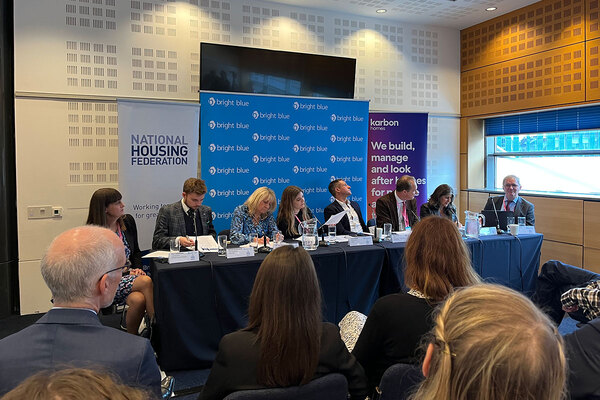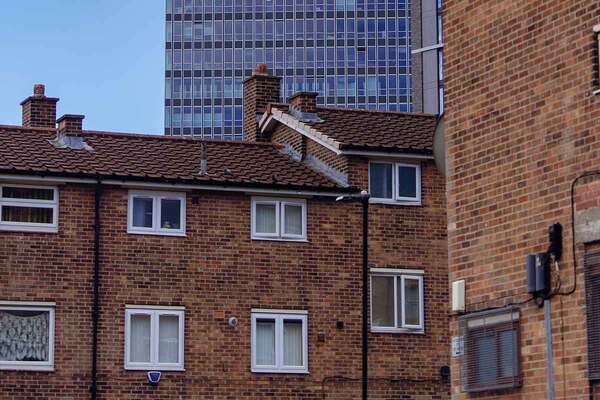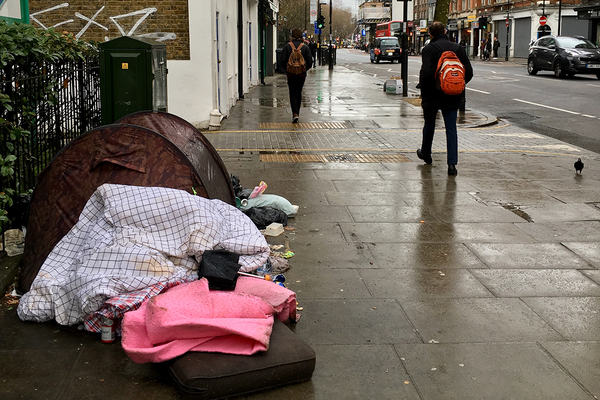You are viewing 1 of your 1 free articles
Councils ‘about to go bust’ over temporary accommodation costs, CPC23 attendees told
Councils are “about to go bust” because of the cost pressures of housing people in temporary accommodation, the leader of Wiltshire Council has said.
Speaking from the audience at a session on temporary accommodation at the Conservative Party Conference on Tuesday, Richard Clewer said that his council had invested in stock and does not rely on B&Bs, but that surrounding districts “are about to go bankrupt”.
He said: “I cannot cannot overstate the importance of this as a problem across not just Wiltshire, but the whole of the UK.
“I got handed housing 10 years ago. We don’t use B&B because we’ve increased stock of temporary accommodation. We’ve just reached £10m to leverage to buy more.
“If I look at surrounding districts, they are about to go bust because of the cost of temporary accommodation, let alone B&B.
“I’m talking to the converted here. It’s deeply depressing. OK, it’s 8.45pm [but] there really ought to be some of the other councils here because some of them are going bankrupt because of this and they’re not paying attention,” Mr Clewer said.
The session was put on by temporary accommodation charity Justlife and the Shared Health Foundation.
Christa Maciver, head of research, policy and communications at Justlife and co-secretariat of the Temporary Accommodation All-Party Parliamentary Group (APPG), spoke about the research the group published in January.
The damning report on the state of temporary accommodation in England, which called for the sector to be regulated by including it in the Social Housing (Regulation) Bill, revealed issues with health and safety, disrepair and overcrowding. It also found significant issues with accessibility.
Alongside the report, Justlife published mortality data: between April 2019 and March 2022, 34 children died in temporary accommodation, most of them under the age of one, and their housing was considered a contributing factor in their deaths.
Ms Maciver also referred to research on health and safety hazards found in temporary accommodation in the capital.
Setting the Standard, an agency that enforces standards in temporary accommodation used by 29 councils in London, told Justlife at a conference last week that using its rating system of A to E, most of the properties are now rated D.
“Which means that they have at least one category two hazard,” Ms Maciver said.
Dr Laura Neilson, founder of the Shared Health Foundation, researches the health impacts of temporary accommodation on children, which she says is very hidden.
“In the UK at the moment, we think there are about 131,000 children living in temporary accommodation, about 4,000 primary schools’ worth.
“So 50% of all people who are in temporary accommodation, are homeless in England, are children, which is a statistic that we just don’t talk about,” she said, adding that most of them are “living in unsuitable accommodation”.
Dr Neilson is calling for families to be considered as a different cohort and not to be placed in accommodation with single men.
“One of the things we’re asking for is proper risk assessment. I’d like to see a policy change where we don’t put families in the same accommodation as single men.
“They are just very different cohorts, they’ve got very different issues, they are not good mixing. It won’t cost any more money, that’s a policy change.”
Dr Neilson said the foundation is also calling for cots for children. Referring to the child mortality figures in temporary accommodation, she said that cots have “got to be a part of it”.
“Most of these kids were under one. So we’re asking for a commitment, which the government could make today, that every child has the right to sleep in a cot,” she said.
The foundation is also asking for access to education in line with what looked-after children get – special arrangements are made when they move to an area.
Dr Neilson said the most recent research from two years ago found that children miss an average of nine months of education when they move into temporary accommodation.
She is also calling for an automatic notification system when children move out of area.
There is currently no mandate for councils to notify local authorities when they send households to their area.
The issue of Local Housing Allowance (LHA) not covering rent was raised during the session.
LHA rates were restored to the cheapest 30th percentile in response to the COVID-19 pandemic in 2020, but they have been frozen since then and have not kept pace with inflation.
They often do not cover rents in the private rented sector, meaning families are often sent out of area or remain stuck in poor temporary accommodation.
Mr Clewer said that there are currently no houses for rent in Wiltshire that meet LHA.
When asked about how to alleviate cost pressures in temporary accommodation without tackling LHA, panellist and former work and pensions secretary Iain Duncan Smith said he had discussed it with the current secretary of state at the conference.
He said: “We had a very good debate today about the welfare reform programme. Of course COVID has punched a hole through a lot of what was possible to be done in 2020, which I set out before I resigned in 2016.
“One of the areas that we did debate today and talk about was the whole issue of Local Housing Allowance, in particular key areas where market rates have risen and LHA isn’t keeping pace with that now. So that’s a big issue.
“We had the secretary of state there, and actually two other ex-secretary of states and myself. We did say that this is one of the priorities that we have to look at now just to stabilise the ship.
“It’s not going to solve the problem but it will stabilise things and the private sector is the only sector that can expand quite rapidly if given the right incentives,” he said.
Sign up for our homelessness bulletin
Already have an account? Click here to manage your newsletters












